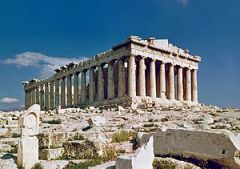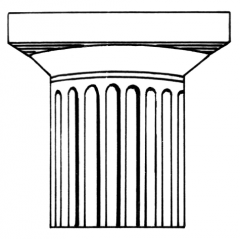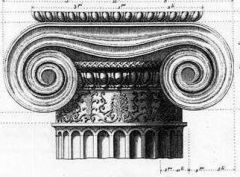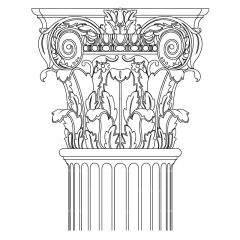![]()
![]()
![]()
Use LEFT and RIGHT arrow keys to navigate between flashcards;
Use UP and DOWN arrow keys to flip the card;
H to show hint;
A reads text to speech;
58 Cards in this Set
- Front
- Back
|
Draco |
- Became Archon in 621 BC - Established permanent harsh law code. |
|
|
Draco's Reforms Caused |
Unrest in lower classes |
|
|
Draconian Laws |
-Death was the penalty for even minor crimes. - Different classes treated differently -Murders punished by state |
|
|
Dracos Lasting Impact |
- Written Laws meant aristocrats could not change laws when wanted |
|
|
Solon |
-Made sole archon in 594 BC - tried to appease poorer classes - Divided citizens into four classes |
|
|
Solon appeased poor by |
- Cancel out debts - Outlawed slavery for debt - Freed enslaved from debt |
|
|
Clases made by Solon |
- Archons and Areopagus - Council of 400 - The poorest(could only vote in assembly) (based on income not birth) |
|
|
Solons reforms |
- Death penalty only for murder - Opened high offices to more citizens - Gave assembly greater say in important decisions - More citizens had a say but citizenship was still limited and only wealthy held office |
|
|
Pisistratus |
- Tyrant off and on from 560-527 bc - Son, Hippias was evil ruler -Helped lower classes |
|
|
How did Pisistratus help lower clases |
- Exilied nobles, seizing land giving it to the poor - Loans to poor farmers - New jobs for poor |
|
|
Pisistratus reforms |
Reduced Taxation -Introduced festivals - Increased trade and commerce - Produced coin money - Beautified the city - Had official copies of Iliad |
|
|
Cleisthenes |
- Father of democracy - Came to power in 510 bc - Divided citizens into ten tribes called demes -Male citizens over 30 became citizens, all |
|
|
Cleisthenes reforms |
-Set up council of 500 which proposed laws to the assembly - Tribes based on based on geography - Established a democratic court system with trial by jury - Juries composed of random people - Citizenship excluded women - Slaves had no rights or freedoms |
|
|
Pericles |
- extended offices to lower class paid offices - Elected 10 generals each year - Ostracism - Golden Age |
|
|
Later Pericles Reforms |
- Citizenship expanded to all free males born in Athens - Council of 500 focused more on daily business - Assembly given power to debate and make laws |
|
|
Socrates |
-Taught for free - "the unexamined life is not worth living." - Eventually sentenced to death for corrupting youth -didnt write |
|
|
Socratic Method |
ask questions, don't give answers |
|
|
Plato |
-Wrote Extensively(the republic) - Taught that philosophers should be kings - Opened a school called the Academy - Focused on ideals/reforms - Credited with recording Socrates philosophies as dialogues - Allegory of the cave |
|
|
Aristotle |
- Wrote extensively - Use logic _ opened school named the Lyceum - Focused on nature(classifying in biology) - Interested in scientific proof - Taught Alexander the Great |
|
|
Aristotle Quotes |
"all things in moderation" "man is by nature a political man" |
|
|
Phidias |
-Sculptor - Made Statue for Parthenon |
|
|
Classical art |
-Shows order and balance -{portrays an Ideal View -Right before movement |
|

|
- temple dedicated to Athena - Classical Architecture |
|

|
-Doric Columns |
|

|
-Ionic Columns |
|

|
-Corinthian Columns |
|
|
Hellenistic Art |
-Shows Emotion and Movement |
|
|
Herodotus |
- Father of modern history - The Persian Wars |
|
|
Thucydides |
- Lack of bias -Wrote about Peloponnesian War |
|
|
Homer |
-The Iliad - The Odyssey - Blind Poet |
|
|
Aeschylus |
-Agamemnon - Wrote Tragedy |
|
|
Sophocles |
-Antigone - oedipus REX - Wrtoe Tagedy |
|
|
Euclid |
- Father of geometry - The Elements |
|
|
Pythagorus |
-Pythagorean Theorem |
|
|
Archimedes |
- Calculated Pi |
|
|
Archimedes |
-Lever and pulley - Archimedean screw - Eureka when discovered buoyancy theory |
|
|
Hippocrates |
- "father of modern medicine' - Oath for doctors |
|
|
Philip II of Macedon Goals |
1. Build strong army 2. Unify Greek City states 3. Defeat Persia |
|
|
Philip II outcomes |
- Philip builds strong army - unifies Greece - Murdered before persian invasion - wife Olympias. Persian Asassin) |
|
|
Alexanders Appeals to Soldiers |
- Served in fathers army - Great leader - Charismatic - Brave - Proven Winner |
|
|
Alexanders Appeals to Aristocracy |
- Well educated - Good Blood lines - Brilliant Orator |
|
|
Alexander the King |
- With help of mother he is day king - Fulfill persian legacy |
|
|
Conquests and Battles |
- 334 Battle of Granicius - 333 Battle of Issus(Syria) - Egypt: Establishes the city of Alexandria and is declared pharaoh - 331 Battle of Gaugamela- defeats arias' army- arias escapes but is later killed - Alexander declares himself king of persia and declares Babylon the capital - Conquered river valleys |
|
|
Death |
Tired troops force alexander back and he falls ill at 33 |
|
|
three empires after alexander |
- Ptolemey: Egypt - Selecucus: Modern Middle East - Antigonus: Greece and Asia minor |
|
|
Hellenistic culture |
Mix of greek, persian, Egyptian, and indian culture. |
|
|
Cynics Diogenes |
- Ignore social conversations and avoid luxuries - Citizens of the world - Live a humble simple life |
|
|
Epicurians Epicurus |
- avoid pain and seek pleasure - all excess leads to pain - politics should be avoided |
|
|
Stoies Zeno |
- nature is the expansion of divine will -concept of natural law - get involved in politics, not for personal gain, but to preform virtuous acts for the good of all - true happiness is found in great achievements |
|
|
Cyrus the Great |
- Tolerant ruler who a,lowed different cultures within his empire - The Greeks called him a "law-giver" - The Jews called him the "anointed of the lord" - freed jews to palestine |
|
|
Darius the Great |
- Built Persepolis - He Extended the Persian Empire to the Indus River in northern India - Huilt a canal to Egypt - Established tax collecting system - Established network of spies called the kings eyes and ears |
|
|
Satraps |
- Royal appointees over Strapies - 23 - each was required to pay a set quantity of silver |
|
|
Xerxes |
Grandson |
|
|
Zarathustra |
Good thoughts, Good Deed, Good Works |
|
|
Dualistic Battle of Good vs. Evil |
-Ahura Mazda- holy spirit - Ahriman - destructive spirit |
|
|
Zend- Avesta |
Book of law |
|
|
Cause of Persian War |
- Datius to expand demands the surrender of Athens and Sparta. They surrender |
|
|
Battles of Marathon |
- |

